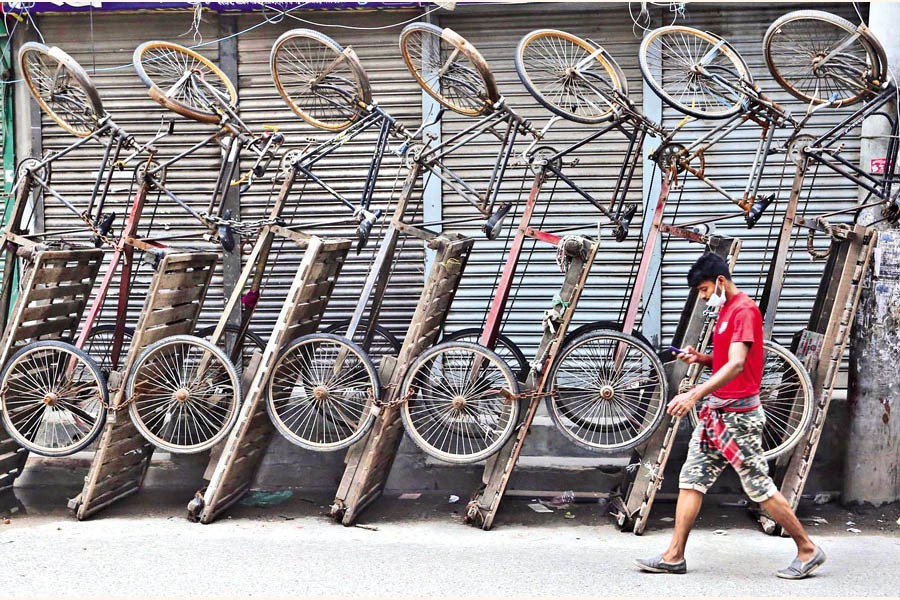The ongoing hard lockdown, which is seen essential to contain both Covid fatalities and infections, has again hit the poor and low-income people hard.
In fact, the restrictions on movement of people and economic activities have dealt almost a death blow to millions of daily wage earners. When they were licking their wounds inflicted on them during the first wave, the second one is proving to be a deadly one.
A large number of them are now queuing up at the OMS (open market sale) points to get subsidised food-grains. As a result, food items sold at the OMS outlets are getting exhausted within a short time. Many return home empty-handed, disappointed.
Even those who are exempted from the restrictions are failing to get both ends met because their businesses are extremely dull.
The FE correspondents witnessed the pathetic scenes while visiting various locations in the capital over the last few days.
The correspondents found some eight to ten day-labourers in front of the Better Life Hospital at Rampura area on Monday morning.
The labourers rushed to the reporters while they were approaching them. They seemed deeply disappointed as soon as they came know about the identities of the correspondents.
Talking to the FE, Mofiz Mia, a 45-year-old man from Rangpur, said he came to Rampura early in the morning in search of work. But he did not find any work over the last four days, as people skipped doing other works barring emergencies.
"Now we've heard that the government is planning to extend (already extended) the nationwide lockdown for another week. Then how will we survive?"
When asked about the government's support, he said they heard about such supports only on television.
"But where is the assistance? I did not get any. I just got a packet of food from someone on the first day of the hard lockdown. That's it," he added in a note of frustration.
Md. Rana Hamid, proprietor of Jui Shoe Gallery - located at Rampura Super Market, said they had resumed business with lots of hope before the pandemic second wave hit the country.
The ongoing spell of lockdown came at a time when the traders like him made reinvestment with loans targeting the upcoming Eid-ul-Azha, he said.
"Now, what will happen to me? And how can I meet the demands of my family and repay the installments? Go and see the lines at OMS points, you will probably see the real picture," he added.
Visiting an OMS point in Malibag Bishwa Road area, two separate long queues of male and female were found.
Rezia Akhter, a 35-year-old housewife, said her husband was a tailor, having a shop at Mouchak Market. But he did not get orders, as the lockdown forced him to shut the shop.
"This is the first time I've stepped into the OMS line, as my husband is feeling shy to come to get food-grains at subsidised prices," she noted.
Asiya Akhter, a widow-cum-domestic helping hand, said she lost her job, as people were not allowing her to work in their houses in the lockdown in the fear of getting virus.
"I came here in the last two days to buy products from the OMS. But I did not get any, as all items were sold out by noon. I don't know what will happen today," she added.
Abdul Motaleb, the OMS dealer at Malibag point, said the number of people, wishing to get subsidised rice and atta, had been increasing fast soon after the lockdown that really came as too hard a measure for the low-income groups.
"We are allowed to sale 1,000 kilogrammes of rice and atta a day. It normally took six to seven hours to finish the target earlier. Now it is taking only two to three hours," he mentioned.
When contacted, CPD Senior Research Fellow Towfiqul Islam Khan said the lockdown has hit the income of the low-income groups hard, and it is creating a new segment called 'new poor' in the economy.
But the issue of the 'new poor' has been overlooked in the national budget for the financial year (FY) 2021-2022, which is unfortunate.
The government should recognise the existence of the 'new poor', especially in the urban areas, and urgently bring them under a special social protection coverage, he also said.
Regarding existing social protection, Mr Khan noted that the social protection budget proposed a 12.5 per cent hike in the FY 22 compared to the corresponding figure of the revised budget in FY 21.
"If we exclude pension for public servants, savings certificate interest and agriculture subsidy, the social protection budget increased by only 2.9 per cent," he added.
jubairfe1980@gmail.com and talhabinhabib@yahoo.com


